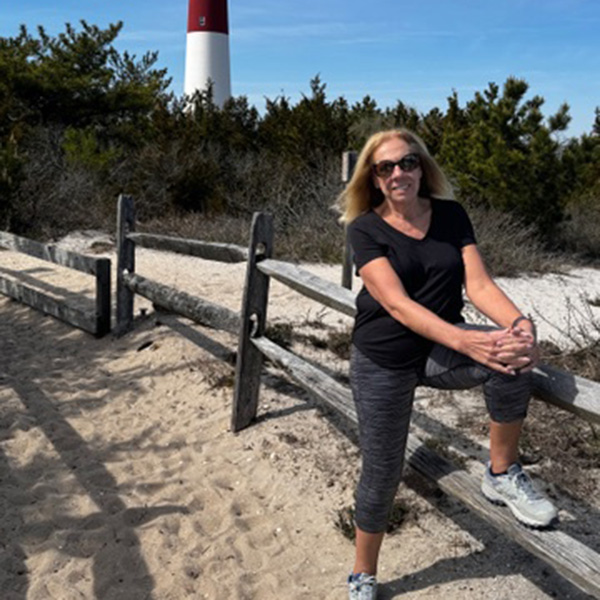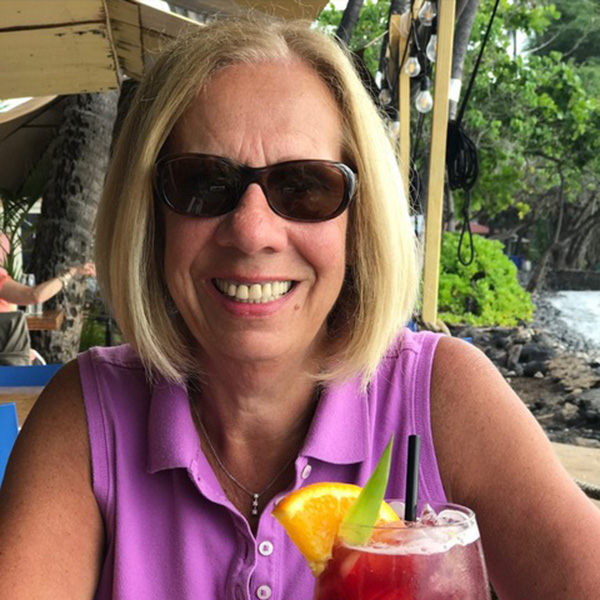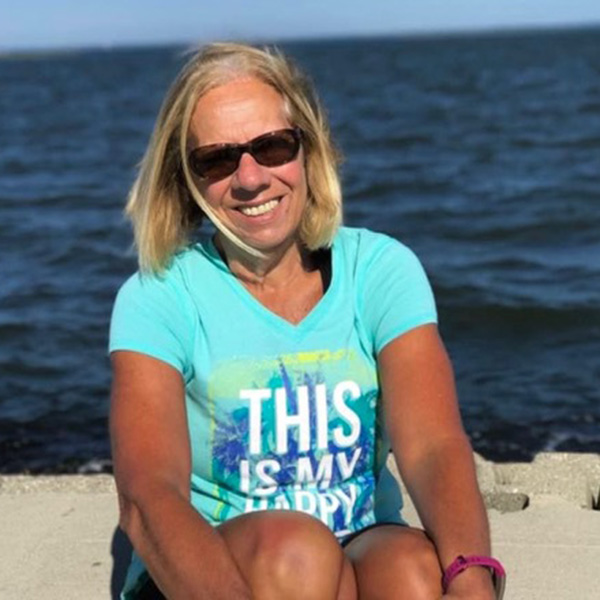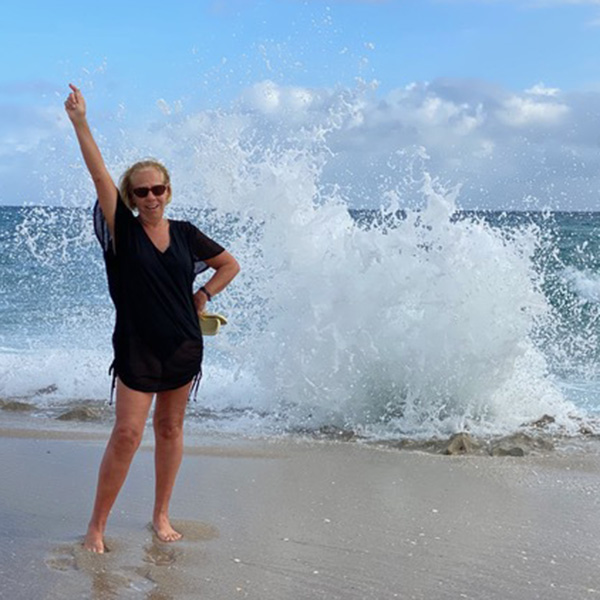Lynn’s story
Lynn says gastroparesis controlled her life more than the COVID-19 pandemic. Now, with the help of Enterra® Therapy, she’s back in charge.

Lynn, Enterra Therapy patient
In 2021, Lynn was set to enjoy her retirement after a 40-year career in the finance industry.
But when she began experiencing debilitating nausea, it would take her over two years, dozens of appointments, and an array of treatment options before she ultimately found relief through Enterra Therapy.
Today, she shares her story in the hopes that it can help someone else.
Beyond your severe nausea, what was toughest for you about living with gastroparesis?
You know, it’s funny—my symptoms started during the pandemic, but I feel like gastroparesis limited my life way more than COVID-19 ever did.
For me, the hardest thing was feeling like I stopped living. I stopped being in control of my life.
I’ve always loved having people over for big barbecues, big dinners—and I couldn’t cook for people. I couldn’t stand the sight of food. It was really tough.
People just really didn’t understand. Of course, I told my friends that I had gastroparesis. I explained to them that my stomach was emptying slowly and that it made me nauseous, but nobody had really heard of it. It’s not like saying you have the flu or a cold.
It’s just hard to understand. People don’t really understand the control gastroparesis has over you.
Can you tell us more about feeling like you’re not in control of your life?
I feel like gastroparesis took away control of what I could do, what I could eat, where I could go.
I just sat in a chair all day. I didn’t want to be around anybody because I felt miserable, and I didn’t want to pass that on to other people. I was always a very happy, outgoing person—the life of the party. So for people to see me like that, it was horrible.
Friends I’ve known for years tell me that I’m back to being myself again. So many people have said that to me, it’s made me realize just how bad off I must have been. It really changed my personality, being so sick. I wasn’t that fun-loving, funny person when I was sick. It’s tough to think about.
Once you discovered that Enterra Therapy was a treatment option, what made you consider trying it?
For me, there was no other option. That’s how I feel about it.
When my symptoms started, I spent all of my time going to doctor after doctor. It got so bad that I actually had a spreadsheet of which hospital I was going, to which doctor I was seeing, which tests they wanted to do. Within that first year, 2021, I had at least 40 doctor appointments alone. It was absolutely insane. I could barely think from one day to the next.
None of the other pills or procedures that I had done helped me. In fact, my symptoms just continued to get worse. So when I got connected to a gastroenterologist who told me about Enterra Therapy, I just didn’t have any reservations. I was desperate. I would have tried anything, that’s how bad it was for me.
How are your gastroparesis symptoms now, after receiving Enterra Therapy?
Day-to-day? I feel 100% better. There is no comparison. To be honest with you, I don’t think I would be here if it wasn’t for this device.
I received my Enterra Therapy System in August of 2022 and by December, I felt like a totally new person.
Before I got it, I was kind of lifeless. I spent most of my life sitting in a chair, nauseous. I was sick all the time; I couldn’t do anything. I wouldn’t go out. I didn’t see any of my family, I didn’t see any of my friends. That’s just how bad it was.
Since getting my device, I’ve weaned off most of the medicines they put me on to control my symptoms.
I’m back to eating my Italian food, cooking, going out to restaurants. I’m just careful about what I eat. The only things I have to be careful about is not eating too late at night, or eating things that I think might be too difficult to digest. But other than that, I can’t think of anything that I’ve tried to eat in the last 6 to 8 months that hasn’t worked for me.


How is life now, Lynn?
I feel like I’ve started living again. I’m almost never nauseous now. I can concentrate again, I can do things again. I can read my books again, go on vacations again. I’m back to cooking my Italian food, back to having friends over for dinners.
This past November, we moved to a 55+ community. There’s a big clubhouse and a pool waiting for me when the weather is good. There’s nice people and lots to do—it’s fun. And I would never have been able to do this 3 years ago. Now, I’m actually living my retired life.
What made you want to share your story?
To hopefully help somebody else.
It was such a lonely time in the beginning. I wasn’t reaching out or seeking advice or help from family. I really kept things between myself and my husband most of the time.
But if somebody can look at me and see that there’s hope, that you can get your life back, that’s all I want. If I can help even one person, sharing my story will be worth it.


What advice would you give to someone who has gastroparesis?
I guess I have three big pieces of advice for someone in a similar position that I was.
First is to see if Enterra Therapy is an option for you. Take that leap and seek out a doctor or a fellow Enterra Therapy patient who can help you figure that out. Because for me, this treatment was the only hope that I saw. It gave me hope.
My second piece of advice is to try things for yourself. Gastroparesis is so centered on “don’ts.” Don’t eat this, don’t do that. But it’s so different for everybody, you’ve got to try things on your own. You’ve got to figure out what works for you.
Last, be kind to yourself. Do whatever you can do to get through, and try not to give up. Because there is hope. There is hope.
Lynn’s experience is unique to her and individual results may vary.
Could Enterra Therapy be Right for You?
Answer a few short questions to see if you may be a candidate and get a downloadable guide to help you start a conversation with your doctor.
IMPORTANT SAFETY INFORMATION
Enterra Therapy for treatment of chronic, resistant to medication nausea and vomiting associated with gastroparesis caused by diabetes or an unknown origin in patients aged 18 to 70 years: patients should always discuss potential risks and benefits of the device with their physician.
*HUMANITARIAN DEVICE
Authorized by Federal law for use in the treatment of chronic intractable (drug refractory) nausea and vomiting secondary to gastroparesis of diabetic or idiopathic etiology in patients aged 18 to 70 years. The effectiveness of this device for this use has not been demonstrated. What does this mean?
